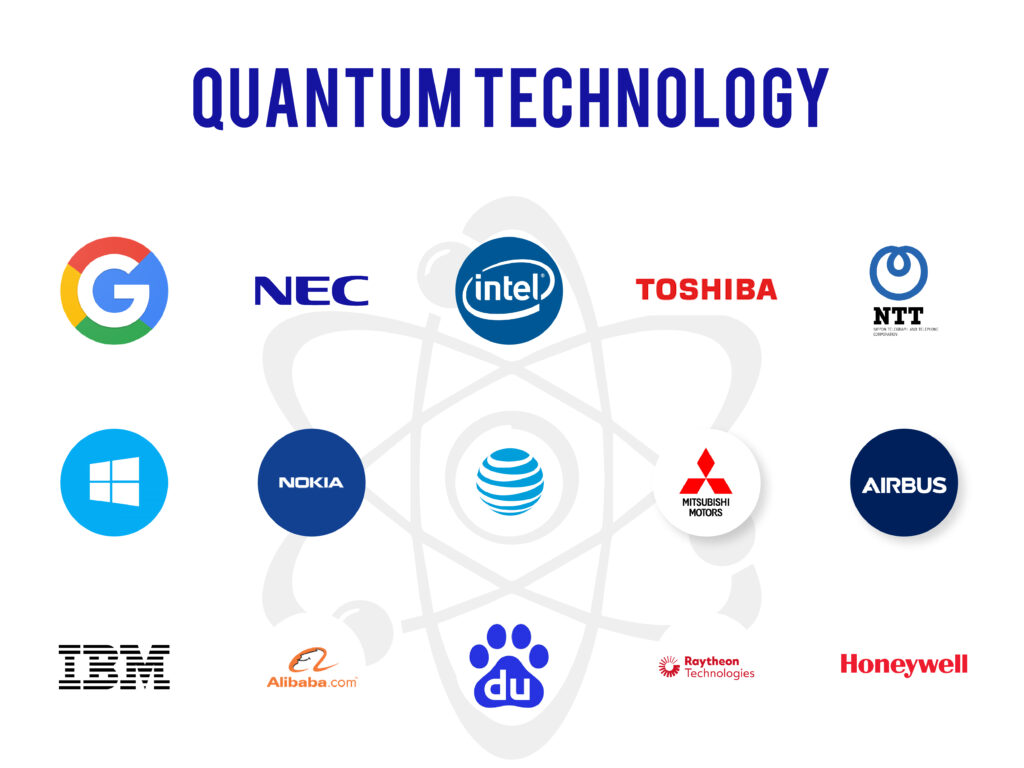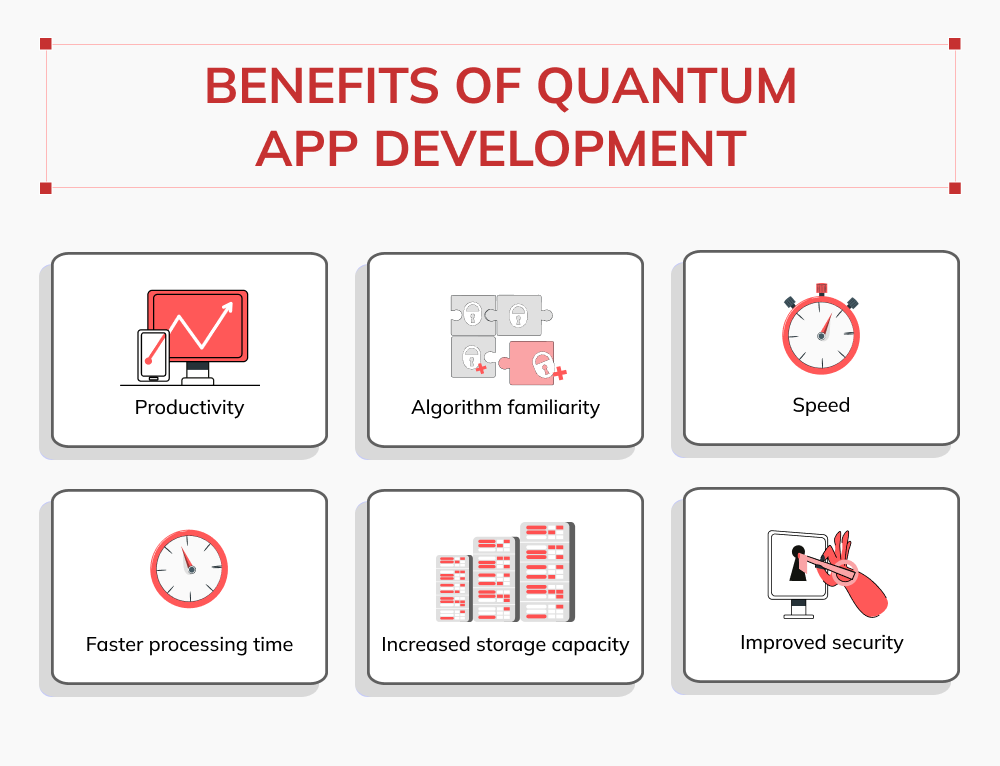In recent years, quantum computing has gained popularity, offering tremendous potential for solving complex problems in various fields. Quantum computing is a technology that uses quantum mechanics to perform computations, which is a significant leap from classical computing. Quantum computing offers great possibilities in app development, and it is essential to understand how quantum app development can take businesses and industries to the next level.
What is Quantum App Development?

Quantum Development, also known as Quantum Computing, is a rapidly growing field that involves designing and programming quantum computers. Classical computers rely on bits to store and process information, whereas quantum computers employ qubits that exist in a superposition state, enabling them to carry out computations at a much faster rate than classical computers.
Quantum computing technology is still in its nascent stage, and the hardware necessary to construct a quantum computer is intricate and costly. However, researchers and companies worldwide are investing heavily in this technology because of its potential to solve complex problems in fields such as cryptography, materials science, drug discovery, and more.
Understanding Quantum App Development
Quantum App Development is the process of designing and creating applications that utilize the unique properties of quantum computing to solve complex problems. Classical computing relies on bits to store and process data, while quantum computing employs qubits that can exist in multiple states simultaneously. This attribute enables quantum computers to perform specific computations significantly faster than classical computers.
One example of a Quantum App is quantum cryptography. In classical cryptography, messages are encrypted using mathematical algorithms that are extremely difficult to break. However, with the advent of powerful classical computers, some of these algorithms can be broken using brute force. Quantum cryptography offers a more secure solution by using the principles of quantum mechanics to encrypt messages. A secure method of encryption can be achieved using Quantum Key Distribution (QKD), in which qubits are utilized to create a shared secret key for encrypting and decrypting messages.
Another example of a Quantum App is quantum simulation. Quantum simulation involves using quantum computers to simulate complex quantum systems that would be difficult or impossible to simulate using classical computers. This can be used to design new materials with specific properties, model the behavior of molecules and chemical reactions, and more.
History of Quantum App Development

Quantum App Development is a relatively new field that has gained momentum in recent years with the advent of new quantum computing technologies. The early roots of quantum computing can be traced back to the 20th century with the advancement of quantum mechanics.
- In 1900, Max Planck introduced the concept of quantization, which described the energy of a system as a series of discrete packets, or quanta. This led to the development of quantum mechanics, which described the behavior of particles at the atomic and subatomic levels.
- In the 1980s, physicist Richard Feynman proposed using quantum systems to simulate complex physical systems. This led to the development of quantum simulation algorithms, which have become an important application of quantum computing.
- In the 1990s, physicist Peter Shor developed a quantum algorithm for factoring large numbers. This algorithm demonstrated that quantum computers could solve problems exponentially faster than classical computers, leading to renewed interest in quantum computing research.
- In the early 2000s, several companies and research institutions began developing the first quantum computers. These early quantum computers were relatively small and could only perform simple calculations. However, they paved the way for the development of more powerful quantum computers in the future.
In the recent years, there has been a notable surge in interest in quantum computing, with several companies such as IBM, Google, and Microsoft investing heavily in this technology. As a result, new quantum programming languages, including Qiskit and Quil, as well as new quantum software libraries and tools, have been developed.
Implementing Quantum App Development System
Implementing a Quantum App Development System can be daunting, as it involves working with cutting-edge technology that is still in its early stages. Building powerful quantum applications that can solve complex problems is possible with the right approach and tools. Here is how you can implement the Quantum app development system:
Understanding the Fundamentals of Quantum Computing
It is essential to have a strong grasp of the basics of quantum computing before delving into quantum app development. This includes understanding the principles of superposition, entanglement, and interference and the differences between classical and quantum computing.
Choosing the Right Quantum Development Environment
Several Quantum Development Environments (QDEs) are available, each with its own strengths and weaknesses. Some of the most popular QDEs include IBM Qiskit, Microsoft Q#, and Rigetti Forest. Choosing a QDE that is well-suited for your needs and has a strong community of developers and users is important.
Building Quantum Circuits
Once you have chosen a QDE, the next step is building quantum circuits. Quantum circuits are similar to classical circuits but use qubits instead of bits. You will need to learn how to design and manipulate quantum gates, which are the building blocks of quantum circuits.
Testing and Debugging Quantum Circuits
Testing and debugging quantum circuits can be challenging, as quantum systems are prone to errors and noise. You will need to learn to use tools like quantum simulators and quantum error correction techniques to ensure your quantum circuits are working correctly.
Implementing Quantum Algorithms
Once you have mastered the basics of quantum circuit design, you can start implementing quantum algorithms. This includes algorithms for quantum cryptography, quantum simulation, and quantum machine learning.
Deploying Quantum Apps
Once you have built and tested your quantum app, the final step is to deploy it. This may involve running your app on a real quantum computer or using a cloud-based quantum simulator. You must ensure that your app is optimized for the specific hardware and software environment you are using.
Practical Quantum App Development Avenues

Quantum computing is a rapidly evolving field with many potential applications. As quantum technologies continue to advance, there are many practical avenues for Quantum App Development, some of which are mentioned below:
Quantum Cryptography
Quantum cryptography is an application of quantum computing that uses quantum systems to secure communication channels. This can involve quantum key distribution, quantum random number generation, and quantum secure communication protocols.
Quantum Simulation
Quantum simulation involves using quantum computers to simulate complex physical systems, such as chemical reactions, materials science, and particle physics. This can provide insights into the behavior of systems that are difficult or impossible to simulate using classical computers.
Quantum Machine Learning
Quantum machine learning involves using quantum computing to train and optimize machine learning models. This can significantly improve pattern recognition, classification, and optimization.
Quantum Optimization
Quantum optimization involves using quantum computing to solve optimization problems that are difficult or impossible to solve using classical computers. This can include problems in logistics, scheduling, and financial modeling.
Quantum Sensing and Imaging
Quantum sensing and imaging involve using quantum technologies to measure and image physical systems with high precision and accuracy. This can include medical imaging, remote sensing, and environmental monitoring applications.
Quantum Financial Modeling
Quantum Financial modeling involves using quantum computing to model financial systems and markets. This can provide insights into complex financial systems and enable more accurate predictions and risk management strategies.
Anticipated Developments in the Future of Quantum App Development
As technology continues to evolve, the future of quantum app development holds exciting developments that could unlock new possibilities for computing. Here are some anticipated developments in the future of quantum app development:
Increased Integration with Classical Computing
One of the most significant developments in the future of quantum app development is the integration of classical and quantum computing. This integration will allow developers to create hybrid applications that leverage the strengths of both classical and quantum computers. This could lead to more powerful and efficient computing systems.
Advancements in Quantum Hardware
As quantum technology continues to mature, we can expect to see advancements in quantum hardware. This includes the development of more powerful and reliable quantum processors, as well as the creation of more stable and scalable quantum systems. These advancements will enable developers to build more sophisticated quantum applications with higher precision and accuracy.
New Quantum Algorithms and Applications
The development of new quantum algorithms and applications is expected to be a major area of growth in the future of quantum app development. As more researchers and developers explore the potential of quantum computing, we can expect to see new algorithms and applications emerge that could transform various industries.
Quantum Error Correction and Fault Tolerance
Quantum error correction and fault tolerance are critical research areas in quantum computing. In the future, we can expect to see advancements in these areas that could enable the creation of more reliable and stable quantum systems. This will be essential for building large-scale quantum applications requiring high accuracy and precision.
Expansion of Quantum Computing Ecosystem
As quantum technology advances, we can expect to see the expansion of the quantum computing ecosystem. This includes the growth of quantum computing hardware and software vendors and the development of new research institutions and startup companies focused on quantum technology.
More User-Friendly Quantum Development Tools
As quantum technology becomes more accessible, we can expect to see the development of more user-friendly quantum development tools. This will make it easier for developers to build and test quantum applications, even if they do not have a background in quantum physics.
Quantum Computing as a Service (QCaaS)
Quantum Computing as a Service (QCaaS) is expected to become more widespread. QCaaS allows developers to access quantum computing resources over the internet without investing in expensive quantum hardware. This will make it easier for developers to experiment with quantum computing and build new applications.
Integration with Artificial Intelligence and Machine Learning
The integration of quantum computing with artificial intelligence and machine learning is expected to be a major area of growth in the future of quantum app development. This integration could create more sophisticated machine learning algorithms, leading to breakthroughs like drug discovery and materials science.
Quantum Cybersecurity
Quantum computing has the potential to transform cybersecurity by enabling the creation of more secure cryptographic systems. In the future, we can expect to see the development of new quantum cryptography algorithms and protocols that could help protect sensitive data and communications.
Commercialization of Quantum Technology
Finally, we can expect to see the commercialization of quantum technology. This includes the development of quantum applications for various industries, as well as the creation of new startups focused on quantum technology. This commercialization could lead to the widespread adoption of quantum technology and the creation of new jobs and industries.
Future of Quantum App Development: Outlook for the Next Few Years
With the increasing interest in quantum computing, there is a need to develop quantum applications that can take advantage of this technology. In this section, we will discuss the future of quantum app development and the outlook for the next few years.
Advancements in Quantum Hardware
One of the major factors that will drive the future of quantum app development is advancements in quantum hardware. Quantum hardware is still in its early stages, with much room for improvement. As hardware becomes more sophisticated, it will become easier to build quantum applications. Developing new and improved quantum chips will enable developers to build more powerful quantum applications.
Development of Quantum Algorithms
Another factor that will drive the future of quantum app development is the development of new quantum algorithms. Quantum algorithms are the instructions that tell a quantum computer what to do. As quantum hardware becomes more advanced, there will be a need for new algorithms that can take advantage of this technology. New quantum algorithms will be crucial for developing applications that can solve complex problems.
Integration of Quantum and Classical Computing
Quantum computing is not a replacement for classical computing. Instead, it is a complementary technology that can be used with classical computing to solve problems. Integrating quantum and classical computing will be a major driver for developing quantum applications. The combination of classical and quantum computing strengths will facilitate the creation of applications that can resolve problems currently beyond the capabilities of classical computing.
Collaboration between Academia and Industry
The development of quantum applications requires a collaborative effort between academia and industry. Academia plays a crucial role in developing new quantum algorithms, while industry is responsible for developing the hardware and software for quantum computing. Collaboration between academia and industry will be essential for developing quantum applications to solve real-world problems.
Challenges in Quantum App Development
Although quantum computing holds vast potential, quantum app development still faces numerous challenges that must be addressed. One of the major challenges is the high error rate of quantum hardware. Quantum hardware is still in its early stages, and errors can occur during computation. This can lead to inaccurate results, which can be problematic for certain applications. Another challenge is the lack of skilled developers. Quantum computing is a new technology, and there are only a limited number of developers with experience in quantum app development.
Companies Using Quantum Computing For Advanced Purposes
Quantum computing is a rapidly evolving technology gaining traction in various industries. Numerous companies are exploring the possibilities of quantum computing to resolve intricate problems and attain a competitive edge. Here we will discuss some of the companies that are currently using quantum computing for advanced purposes.
IBM
IBM is one of the pioneers in quantum computing and has been at the forefront of the technology for decades. The company has developed a quantum computing platform called IBM Q, which allows developers to access quantum computing resources over the cloud. IBM is engaged in multiple partnerships to investigate the potential of quantum computing across several domains, such as finance, chemistry, and logistics.
IBM’s partnership with Daimler is especially noteworthy, as they are utilizing quantum computing to optimize the logistics of electric vehicle battery production. The project involves using quantum computing algorithms to optimize the supply chain and improve the efficiency of the production process.
Google is another company that has been investing heavily in quantum computing. The company has developed its quantum computing platform called Google Quantum AI (formerly known as Google Quantum Computing), which researchers and developers use to experiment with quantum computing algorithms.
Google has also developed a quantum supremacy chip capable of performing a calculation that would take even the most powerful supercomputers thousands of years to complete. While this feat may not have any immediate practical applications, it is a significant milestone in the development of quantum computing.
Microsoft
Microsoft is a significant contender in the quantum computing industry and has created its own platform known as Azure Quantum. The platform allows developers to access quantum computing resources over the cloud and experiment with quantum algorithms.
Microsoft is collaborating with several partners to investigate the potential of quantum computing in diverse domains, including energy, finance, and logistics. One of their most noteworthy collaborations is with JP Morgan Chase, where Microsoft employs quantum computing to optimize the bank’s trading strategies and risk management protocols.
Honeywell
Honeywell, a multifaceted technology and manufacturing corporation, has been investing in quantum computing since 2018. The company has developed its quantum computing platform, Honeywell Quantum Solutions, which researchers and developers use to experiment with quantum computing algorithms.
Honeywell is partnering with various organizations to study the potential of quantum computing in diverse fields, such as finance, logistics, and chemistry. Honeywell’s collaboration with Cambridge Quantum Computing is particularly notable, as they are employing quantum computing to design a novel algorithm for resolving intricate optimization issues.
Alibaba
Alibaba is a Chinese multinational conglomerate investing in quantum computing since 2015. The company has developed its quantum computing platform called Aliyun Quantum, which researchers and developers use to experiment with quantum computing algorithms.
Alibaba is collaborating with numerous partners to investigate the possibilities of quantum computing in a range of domains, such as logistics, finance, and optimization. Alibaba has established several noteworthy collaborations, including one with the Chinese Academy of Sciences, where they are leveraging quantum computing to design innovative algorithms for optimization and machine learning.
The Cost Of Quantum App Development
The expenses related to quantum app development can fluctuate based on various elements, including the intricacy of the application, the quantum computing platform employed, and the accessibility of adept developers. Here are some estimates and approximations of the cost of quantum app development based on these factors:
Complexity of the Application
The complexity of the application is one of the significant factors determining the cost of quantum app development. A simple quantum application that performs basic computations using a few qubits may cost around $50,000 to $100,000 to develop. However, a more complex application that requires hundreds or thousands of qubits to perform complex calculations may cost up to $1 million.
Type of Quantum Computing Platform Used
The quantum computing platform utilized is another variable that can impact the expenses associated with quantum app development. Currently, two types of quantum computing platforms are available: cloud-based and on-premise. Cloud-based platforms are more cost-effective as they do not require the purchase of expensive hardware. On the other hand, on-premise platforms require significant capital investment in hardware and infrastructure, which can significantly increase the development cost. The cost of cloud-based quantum app development ranges from $50,000 to $500,000, while on-premise development can cost up to $1 million or more.
Availability of Skilled Developers
The availability of skilled quantum developers is another factor that can affect the cost of quantum app development. Due to the complex nature of the technology, the number of experienced quantum developers is relatively small, making it challenging to find the right talent. The cost of quantum app development can be higher if the business needs to hire developers with specialized skills or outsources development to a specialized agency. The cost of hiring quantum developers can range from $100,000 to $250,000 per year, depending on the experience and location of the developer.
In summary, the cost of quantum app development can range from $50,000 to $1 million or more, depending on the complexity of the application, the type of quantum computing platform used, and the availability of skilled developers.
The Benefits of Quantum App Development

The emergence of robust quantum computers and novel algorithms has highlighted the potential of quantum computing to transform numerous industries, such as finance, healthcare, and telecommunications. One area where quantum computing is expected to have a significant impact is app development.
Here are some of the benefits of quantum app development:
Increased Processing Power
In contrast to classical computers, quantum computers have the ability to operate exponentially faster. This means quantum apps can process complex calculations and solve complex problems faster than traditional apps. This can significantly improve data analysis, financial modeling, and scientific research.
Improved Security
Quantum computers can also break many of the encryption algorithms used in traditional apps. Quantum computing has the potential to create advanced encryption techniques that offer greater security compared to traditional encryption methods. This can help improve data and communications security across a wide range of industries.
New Capabilities
Quantum computing enables new capabilities that are not possible with traditional computing. For example, quantum apps can simulate quantum systems, such as chemical reactions or material properties, which is impossible with classical computers. This can prove to be especially advantageous for industries like pharmaceuticals and materials science.
Competitive Advantage
Companies that are early adopters of quantum app development will have a competitive advantage over those that do not. This is because quantum computing is still in its early stages, and there is a significant opportunity to develop new applications and capabilities that are not yet available to competitors.
Collaboration Opportunities
Quantum app development requires a multidisciplinary approach, bringing together physics, computer science, and mathematics experts. This can create opportunities for collaboration and innovation, leading to discoveries and breakthroughs.
FAQ’s
There are many potential applications for quantum computing, including cryptography, optimization, and simulation. Some examples of quantum apps include quantum key distribution for secure communication, quantum annealing for solving optimization problems, and quantum simulation for understanding complex systems.
While a background in quantum mechanics can certainly be helpful, it is not strictly necessary. There are several online resources available that can assist in acquiring a foundational understanding of quantum computing, as well as guide one in programming quantum computers.
Several programming languages, including Q#, Python, and C++, can be used for quantum app development. When selecting a programming language for a project, it is important to consider its specific requirements as each language has its own strengths and limitations. Therefore, a thorough understanding of the project’s needs is essential for making an informed decision about which programming language to use.
The development of quantum apps is a relatively new field, but it has seen significant progress in recent years. Various companies and organizations are investing heavily in quantum computing research and development, which is propelling the field forward and creating new opportunities for quantum app development.
Quantum app development requires access to a quantum computer, which is a specialized type of computer that is designed to perform quantum computations. Several companies offer cloud-based access to quantum computers, which makes it easier for developers to get started with quantum app development.
Many resources available online can help you get started with quantum app development, including tutorials, courses, and programming environments. Some popular resources for quantum app development include the Microsoft Quantum Development Kit, IBM Qiskit, and the open-source project ProjectQ.
The future of quantum application development is promising, with potential breakthroughs in cryptography, optimization, drug discovery, materials science, and more. Quantum applications have the capacity to revolutionize industries and pave the way for new computing possibilities.
The main goal of quantum computing is to leverage the principles of quantum mechanics to solve complex problems more efficiently than classical computers. Quantum computers aim to tackle computational challenges that are currently beyond the capabilities of classical systems, unlocking new insights and driving innovation across various fields.
On a Final Note
Quantum app development is a complex and challenging task, but the benefits of quantum computing make it worth the effort. Quantum apps offer increased processing power, better data analysis, improved efficiency, competitive advantage, and new revenue streams. As quantum computing continues to evolve, the possibilities for quantum app development are limitless. Businesses need to understand the potential of quantum app development and invest in this technology to stay ahead of the curve.



